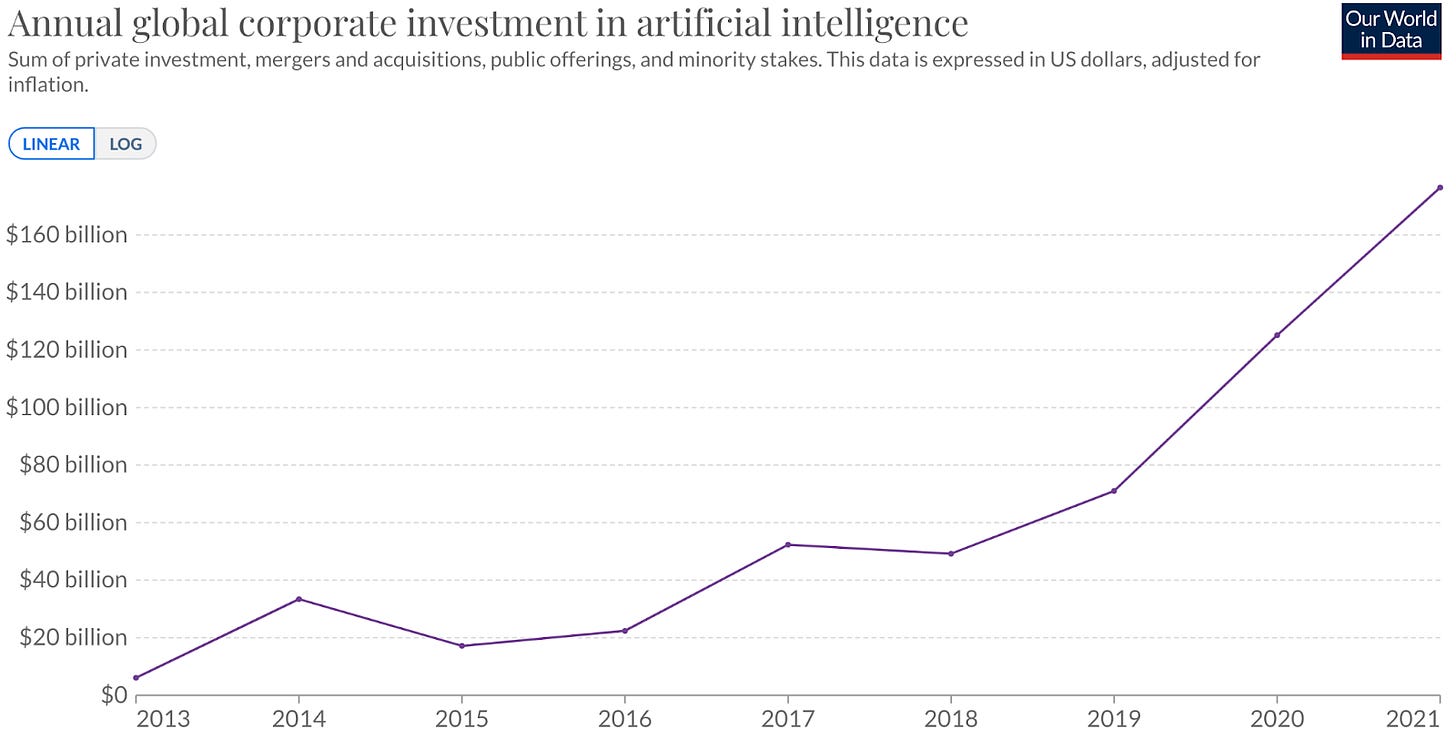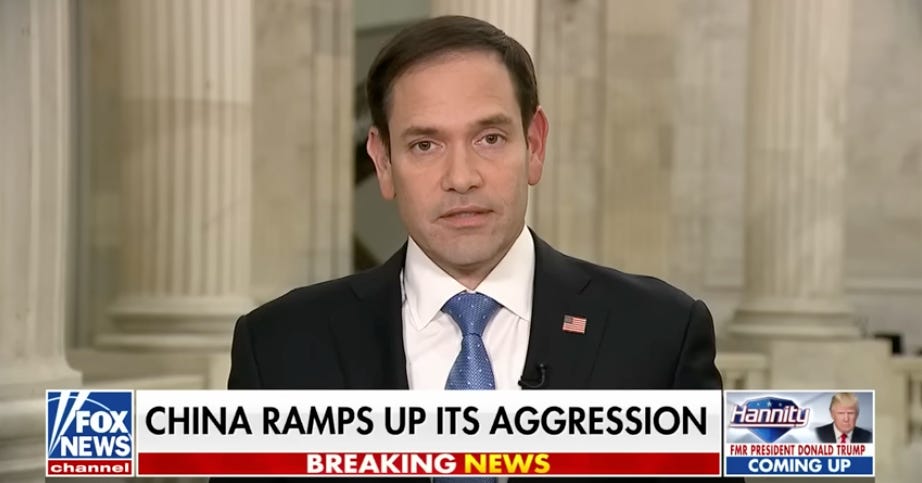Earthling: Pro-Armageddon Americans and the Middle East
Plus: How dumb is Marco Rubio? Nord Stream theory springs a leak, top US soldier vs. top China hawks, paid subscriber perks, and more!
This week, on the NPR show Fresh Air, biblical scholar Bart Ehrman explained how some conservative evangelicals view the Temple Mount—the site (known by Arabs as Haram al-Sharif) where two days later violence between Israelis and Palestinians would break out.
Among the events that must unfold before Jesus can return from heaven, these Christians believe, is that the anti-Christ enters the Jerusalem Temple and claims to be God. But, Ehrman said, “the problem is that, of course, there is no temple. There hasn't been a temple since the year 70 of the Common Era.” And standing on the ruins of the temple—on the Temple Mount—are Muslim holy sites, notably the Al-Aqsa Mosque, aka the Dome of the Rock. So, in the eyes of some evangelicals, says Ehrman, “The Temple Mount has to be taken over—they have to destroy the Dome of the Rock and build the Jewish temple there so the anti-Christ can go into it and Jesus can come back.”
Presumably evangelicals who subscribe to this scenario were gratified when, on Wednesday, Israeli police raided the Dome of the Rock and forcibly expelled Palestinian worshippers. And these evangelicals may not have been terribly upset when this led, predictably, to missiles coming into Israel from Gaza, followed by Israeli retaliation (not to mention, less predictably, missiles coming in from Lebanon, which also brought retaliation). In the eschatology of these particular Christians, such conflict could be the first tremors of the second coming.
Sandwiched in between Ehrman’s NPR appearance on Monday and the violence in Jerusalem that started on Wednesday was a tweet from former Israeli prime minister Ehud Barak that he later deleted. The tweet said that some westerners worry that political developments in Israel are moving the world toward apocalypse. Specifically, Barak wrote, these westerners fear that if Prime Minister Bibi Netanyahu succeeds in his bid to consolidate power by weakening the judiciary, “a messianic dictatorship will be established in the heart of the Middle East, possessing nuclear weapons, and fanatically wishing for a confrontation with Islam centered on the Temple Mount.”
At the risk of disappointing the aforementioned evangelicals: Barak doesn’t think this will happen. Still, Netanyahu’s governing coalition does reflect the growing influence in Israel of ultra-Orthodox Jews, including no few who want to destroy Muslim sites on the Temple Mount and replace them with a third Jerusalem temple. Such provocative acts as this week’s intrusion on the Dome of the Rock (which isn’t within Israel’s borders under international law) reflect this influence. And the videos that emerge from such encounters seem tailor-made to circulate on Arab social media and foment further Israeli-Arab conflict, possibly, one day, bringing the decisive battle on the Temple Mount that some of these ultra-Orthodox long for.
The ominous synergy between Israel’s religious right and America’s religious right is most evident when Republicans are in power. Donald Trump’s movement of the US embassy from Tel Aviv to Jerusalem gratified both constituencies. As did his abandonment of the Iran nuclear deal, an egregiously irresponsible act that gives Israeli-Palestinian conflict of the sort we’ve seen this week greater explosive potential and makes regional conflagration more likely in other ways as well.
Which isn’t to say that Democrats bear no responsibility for the state of the Israel-Palestine situation. Nearly two decades ago Aaron David Miller wrote that, “for far too long, many American officials involved in Arab-Israeli peacemaking, myself included, have acted as Israel's attorney, catering and coordinating with the Israelis at the expense of successful peace negotiations.” This bias prevails to one extent or another under all administrations, Democratic and Republican, because it’s built into American politics. The US isn’t well-suited to be the “honest broker” that the Middle East needs.
Maybe Democrats will do better in future years, as the generational change within their Jewish constituency moves its center of gravity to the left. But that will take time. And, anyway, barring a shift in evangelical influence or ideology, there will always be the threat that Republicans, when in power, will roll back gains Democrats have made.
Maybe hope for peace and stability in the region lies in the waning of American influence there. China’s surprising recent orchestration of détente between Saudi Arabia and Iran is an example of what can be accomplished by a superpower whose Middle East policy is less constrained by domestic politics than America’s. (And the common belittlement of this achievement—that the Chinese were “pushing on an open door”—only strengthens the indictment of the US for having failed to beat China to the punch.)
At the time of this writing, this week’s exchange of fire involving Israel, Gaza, and Lebanon seems to have stopped. But the conditions for a wider conflagration remain. Some powerful nation needs to take a serious shot at addressing the structural sources of this danger before we get a self-fulfilling prophecy of an unusually literal kind. America has spent decades establishing that it’s not seriously interested in being that nation.
Attention paid subscribers! This week we bring you not one, not two, but two-and-a-half paid subscriber perks:
Early access to Bob’s conversation with computational psychologist Michal Kosinski about how human AI is—or isn’t. To access the not-yet-public episode, either click the link above or, if you’ve set up your paid-only Nonzero feed, look for it on your favorite podcast app (where you’ll also find the two perks below).
A new audio essay: “Is Google’s AI conscious?” (you can read the original essay here). After listening, you’ll hear a conversation between Bob and philosopher David Chalmers about, among other things, “the hard problem of consciousness.” That episode was recorded in 2016—but it’s taken on a new kind of relevance in recent months.
2.5. Reminder: As always, tonight NZN will post an episode of the Parrot Room, the after hours, paid-only, part of Bob’s weekly conversation with frenemy Mickey Kaus.
This week Senator Marco Rubio went on Fox News and blamed various bad things on Joe Biden’s failure to show our adversaries that their misbehavior has “consequences.” Here is one of the bad things he mentioned: “Just today, Brazil… cut a trade deal with China. They’re going to from now on do trade in their own currencies—get right around the dollar. They are creating a secondary economy in the world totally independent of the United States.”
It’s true that this development is plausibly attributable to, among other things, some of Biden’s policies. But the policies in question are ones that Rubio wholeheartedly supports. In particular: the prolific sanctioning of countries, ranging from Cuba and Venezuela to Iran and Syria to China and Russia.
One reason China is challenging the dollar’s status as the world’s hegemonic currency—and finding countries that will cooperate—is that so many nations are either a target of US sanctions or worried they’ll become one or tired of the way America uses the dollar’s hegemony to coerce them into sanctioning countries they don’t actually feel like sanctioning. Rubio—whose record leaves no doubt that he applauds all of this—seems not to have made that connection.
Maybe he should have checked out Fareed Zakaria’s show on CNN a few days earlier. Zakaria warned of threats to the dollar’s hegemony and laid out how US policy has intensified them. “Washington’s weaponizing of the dollar over the last decade,” he said, “has led many important countries to search for ways to make sure that they do not become the next Russia.”
On Fox News, Rubio warned that in five years “there will be so many countries transacting in currencies other than the dollar that we won’t have the ability to sanction them.” It’s shocking but apparently true that Rubio isn’t aware of the irony: America has been, with his enthusiastic support, sanctioning its sanctioning power to death.
Remember the Andromeda, the rented sailboat that, we were told last month, had likely been the vehicle for the bombing of the Nord Stream pipeline? Well, you can forget about it—or, at least, push it to the margins of your Nord Stream sabotage theorizing.
The Washington Post reports that German investigators are now saying what lots of other people said after suspicion first fell on the Andromeda: What are the chances that a rented boat the size of the SS Minnow, of Gilligan’s Island fame, and carrying only six people, was the vehicle for a job this big and sophisticated?
Investigators, the Post reports, are now saying that “even skilled divers would be challenged submerging more than 200 feet to the seabed and slowly rising to the surface to allow time for their bodies to decompress.” It would make much more sense to use “remotely piloted underwater vehicles or small submarines” to deliver the hundreds of pounds of explosives involved.
As for when we’ll get a clearer idea of who the Nord Stream culprit is: Don’t hold your breath. The Post reports:
For all the intrigue around who bombed the pipeline, some Western officials are not so eager to find out. At gatherings of European and NATO policymakers, officials have settled into a rhythm, said one senior European diplomat: “Don’t talk about Nord Stream.” Leaders see little benefit from digging too deeply and finding an uncomfortable answer, the diplomat said, echoing sentiments of several peers in other countries who said they would rather not have to deal with the possibility that Ukraine or allies were involved.
In the Wall Street Journal, columnist Greg Ip grapples with the impact artificial intelligence could have on job prospects for Earthlings—including him.
Ip assesses various relevant studies, including one from Goldman-Sachs which found that AI-induced productivity growth could ultimately increase global GDP by 7 percent—a nearly $7 trillion boost annually. While that sounds like a win, Ip notes that big tech-induced productivity gains have historically made losers of the actual humans whose jobs were automated out of existence (at least in the short run, even if there is net job growth in the long run and displaced workers eventually find new kinds of jobs). In fact, that same Goldman-Sachs report estimates 300 million full-time jobs could be displaced worldwide by this new wave of automation.
Past technological revolutions have tended to displace jobs involving repetitive tasks. But new analysis (conducted in part by OpenAI, creator of ChatGPT) suggests AI could now bump mathematicians, web designers, and journalists to the front of the unemployment line. "Our analysis suggests that individuals holding Bachelor’s, Master’s, and professional degrees are more exposed to LLMs [large language models] and LLM-powered software than those without formal educational credentials."
So how worried should people like Ip be? He points out that grand predictions about technological effects on labor have rarely hit the mark, and argues that systems like ChatGPT—with their well-documented shortcomings—are still not sophisticated enough to fully remove humans from the loop. One task they can’t perform, for example, is whistling past the graveyard.
NZN’s graph of the week suggests that AI researchers looking to address those shortcomings increasingly have the funds to do so:

America’s top general has a message for its top China hawks: Cool it on the war-is-right-around-the-corner talk. General Mark Milley, chairman of the Joint Chiefs of Staff, told Defense One that, though it’s possible the US and China will stumble into war, it’s not probable. At least not yet—but overheated rhetoric in both countries could make it more probable. Milley said that’s why he’s been reassuring lawmakers that war with China is “not imminent or inevitable.”
Milley also voiced doubts that China would be able to seize Taiwan. And he stressed the importance of the US having a “geostrategic approach that does not drive Russia and China into each other’s arms.” That, it seems safe to say, will require a change in geostrategic approach.
—By Robert Wright and Andrew Day
Note: My weekly conversation with frenemy and ideological nemesis Mickey Kaus can be found after 11:00 p.m. US Eastern Time (give or take an hour) this evening on Robert Wright’s Nonzero podcast feed or the Nonzero YouTube channel. And our after-podcast podcast—the Parrot Room conversation, which is available to paid newsletter subscribers and Patreon supporters—can be found shortly thereafter by going to the NZN Substack home page—right here—and clicking on this week’s Parrot Room episode. There you’ll also find a way to get the Parrot Room as a feed in your podcast app.
Earthling banner by Clark McGillis. Photos and graphics, unless otherwise credited, are taken from articles linked to in the corresponding text. Thumbnail image (“Death on the Pale Horse”) by Benjamin West.














I like General Milley’s perspectives
Every day I am more convinced that AI will have no problem taking over our world. In a big way I am doubtful we can prevent it. Yes one person could prevent AI from taking over but we are really talking about a world that is untrusting and power oriented. In our world we probably will not stop AI our self because we will be afraid the other power is continuing working on it. Less face it we are not that smart as a species. If we were that intelligent we wouldn’t be in the situation we are in. Another way think about it is if we had time to evolve we might be able to become intelligent enough to solve are problems. But I am afraid time is running out. However I can hope with my small intelligence this will not be how it plays out. LOL
I believe l will take a nice nature hike and put this behind me for a while.